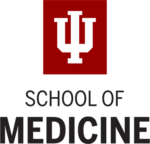Our website is made possible by displaying online advertisements to our visitors.
Please consider supporting us by disabling your ad blocker.
Indiana University School of Medicine
 | |
| Motto | Preparing healers. Transforming health. |
|---|---|
| Type | Public medical school system |
| Established | May 1903 |
Parent institution | Indiana University |
| Accreditation | LCME[1] |
| Dean | Jay L. Hess[2] |
Academic staff | 3,392 full-time and 253 part-time (2023)[3] |
Administrative staff | 2,409 (2023)[3] |
| Students | 1,461 MD (2023)[3] |
| Undergraduates | 253 BS (2023)[3] |
| Postgraduates | 174 MS (2023)[3] |
| 195 PhD (2023)[3] | |
Other students | 1,442 Residents & Fellows (2023)[3] |
| Location | Indianapolis (primary, and an additional eight regional campuses throughout the state) , Indiana , United States 39°46′32″N 86°10′36″W / 39.77556°N 86.17667°W |
| Campus | Urban to suburban |
| Absorbed | The Indiana Medical College, the School of Medicine of Purdue University (1908)[4] State College of Physicians and Surgeons (1908)[4] |
| Average accepted MCAT | 511.7 (2023)[3] |
| Average accepted GPA | 3.80 (2023)[3] |
| Acceptance rate | 5.96% (2023)[3] |
| Website | medicine |
The Indiana University School of Medicine (IUSM) is a major, multi-campus medical school located throughout the U.S. state of Indiana and is both the undergraduate and graduate medical school of Indiana University. There are nine campuses throughout the state; the principal research, educational, and medical center is located on the campus of Indiana University Indianapolis. With 1,461 MD students, 195 PhD students, and 1,442 residents and fellows in the 2023–24 academic year, IUSM is the largest medical school in the United States.[5][6][3] The school offers many joint degree programs including an MD/PhD Medical Scientist Training Program. It has partnerships with Purdue University's Weldon School of Biomedical Engineering, other Indiana University system schools, and various in-state external institutions. It is the medical school with the largest number of graduates licensed in the United States per a 2018 Federation of State Medical Boards survey with 11,828 licensed physicians.[7]
The school has pioneered research in multiple specialties, including oncology, immunology, substance use, neuroscience, and endocrinology. Research discoveries include a curative therapy for testicular cancer, the development of echocardiography, the identification of several genes linked to Alzheimer's disease, and the creation of inner ear sensory cells from pluripotent stem cells.[8][9][10]
In the 2023 U.S. News & World Report rankings of the best graduate schools for medicine, the school ranked 23rd in the nation for primary care and 41st for research out of 192 medical schools.[11] In the U.S. News & World Report rankings of the best hospitals, the Indiana University Health Medical Center had seventeen nationally ranked clinical programs. The Riley Hospital for Children at Indiana University Health is nationally ranked in 9 of 10 designated specialties for children in the U.S. News & World Report.[12] The IU School of Medicine is also home to the Melvin and Bren Simon Comprehensive Cancer Center, a National Cancer Institute-designated Comprehensive Cancer Center. In federal fiscal year 2023, IUSM ranked 29th for National Institutes of Health funding among all US medical schools (13th among all public US medical schools) with $243,608,100 of funding.[3]
It was the only medical school in the state from when the Valparaiso University School of Medicine closed in 1917 to when the Tom and Julie Wood College of Osteopathic Medicine at Marian University opened in 2010. IUSM remains the state's only allopathic, MD degree-granting school.
- ^ "Accredited U.S. Programs | LCME". lcme.org. Retrieved 2024-03-11.
- ^ Hess, the IU medical school's tenth dean, succeeded D. Craig Brater, who retired in 2013. See: "Jay L. Hess, MD PhD". Indiana University School of Medicine. Retrieved January 26, 2018. See also: "D. Craig Brater, MD". Critical Path Institute. June 17, 2013. Archived from the original on January 31, 2018. Retrieved January 26, 2018.
- ^ a b c d e f g h i j k l "IUSM 2023–2024 Fact Sheet" (PDF). Retrieved 8 March 2024.
- ^ a b Cite error: The named reference
PurdueUniversityArchiveswas invoked but never defined (see the help page). - ^ "Indiana University School of Medicine Fact Sheet" (PDF).
- ^ "Table B-1.2: Total Enrollment by U.S. Medical School and Sex, 2018–2019 through 2022–2023". Association of American Medical Colleges. 9 Nov 2022. Retrieved 28 Apr 2023.
- ^ "FSMB Census of Licensed Physicians in the United States, 2018" (PDF). FSMB. Retrieved 27 April 2021.
- ^ "How Lance Armstrong Beat Cancer". Archived from the original on 2012-03-28. Retrieved 2011-07-24.
- ^ "Study Finds Novel Gene Associated With Alzheimer's Disease Development". Alzheimer's News Today. 14 October 2015. Retrieved 23 January 2018.
- ^ Koehler, K. R.; Mikosz, A. M.; Molosh, A. I.; Patel, D.; Hashino, E. (2013). "Generation of inner ear sensory epithelia from pluripotent stem cells in 3D culture". Nature. 500 (7461): 217–21. Bibcode:2013Natur.500..217K. doi:10.1038/nature12298. PMC 3739998. PMID 23842490.
- ^ "Best Medical Schools". U.S. News.
- ^ https://health.usnews.com/best-hospitals/area/in/iu-health-academic-health-center-6420020 [bare URL]
Previous Page Next Page


